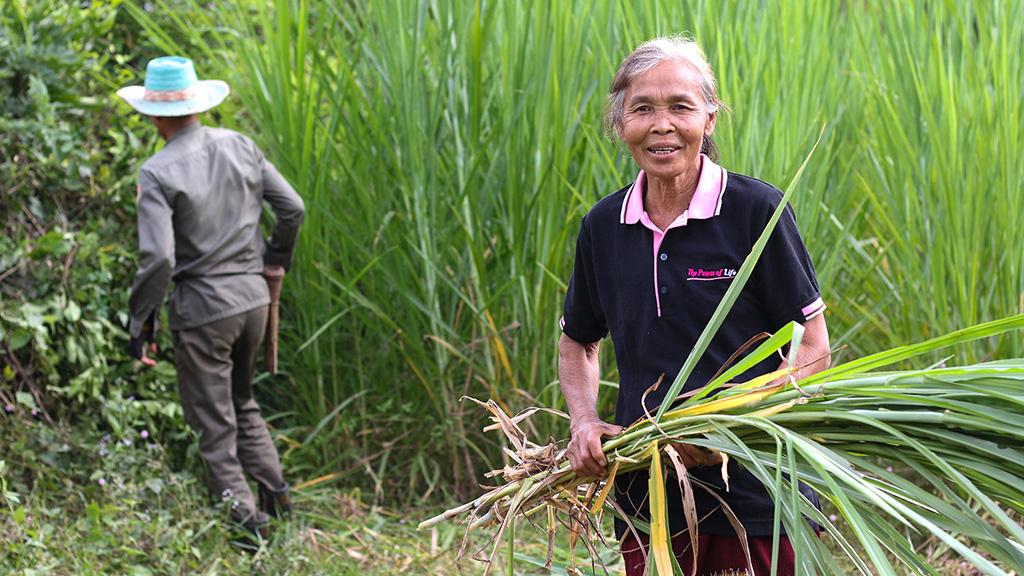
Sustainable Agrifood Systems Sector Project
Climate-resilient and gender-responsive nutritious food production through sustainable agrifood systems.
Sectors
Agriculture, natural resources and rural developmentCountry
Lao People's Democratic RepublicPartners
Green Climate FundEuropean Union
Approval
Financing
Total Project Cost
$65.8 million
ADB Financing
$37 million
Includes $5 million from the Asian Development Fund and $2 million from the Technical Assistance Special Fund
AIF Financing
$10 million
EU Cofinancing
$10 million
GCF Cofinancing
$8 million
High-Level Technology Fund
$0.8 million
Technical assistance through ADB-administered HLTF
ISSUE
High food insecurity, environmental degradation, and low resilience to a changing climate.
In 2024, food inflation in Lao PDR averaged 22% and one in five rural households experienced food insecurity. Agriculture employs more than half the population, yet contributes just over 20% to GDP. Most farmers are smallholders facing multiple challenges, including degraded natural resources, low climate resilience, inadequate productive infrastructure such as irrigation systems and rural roads, and limited access to financial and technical services. Markets are fragmented, and logistics systems are weak. Recent sharp increases in input, fertilizer, and fuel prices have further strained many farming households. At the same time, a small but growing number of farmers are connected with domestic and regional markets, and produce high-value commodities with strong market potential. The regional demand presents significant opportunities for sector growth. To enable more farmers to shift toward commercial production and income-generating crops, several constraints must be addressed. These include the fragmented production and lack of scale; the inadequate financial, technical, and business services; the weak supply chain linkages and logistics; and the limited resilience to climate impacts.
SOLUTION
A green agrifood systems project with strong private sector involvement.
With support from ACGF, ADB designed an innovative agrifood systems project to address key challenges in Lao PDR’s agriculture value chain through a holistic approach, supporting both smallholder farmers and larger actors in the sector. To strengthen smallholder farmers’ technical capacity, access to finance, and resilience, the project will provide community-based technical advisory services, training, and on-farm demonstrations on climate-resilient agriculture and commercialization, delivered by private actors in the value chain. It will also improve farmers’ access to finance for investment in climate-resilient agriculture and trade, enabling a transition to higher-value, income-generating crops and strengthening resilience to climate shocks. To improve commercial viability and market linkages, the project will support agrifood enterprises with technical advisory services and access to finance. This will help strengthen value chains for export-oriented commodities with growth potential, including bamboo, cassava, durian, coffee, and tea. To enhance productivity and connectivity, the project will finance the construction, rehabilitation, and modernization of irrigation facilities and rural roads. The investments will prioritize climate resilience, ensuring that it can withstand extreme weather events. It will also support the accreditation of food safety laboratories to facilitate cross-border trade. The project will directly support women’s economic empowerment by increasing access to finance and advisory services through targeted activities embedded in each project component.
How did ACGF help?
In 2022, ACGF organized an Innovative Finance Clinic on Green Agricultural Value Chain Financing, initiating the collaboration between ACGF and the ADB sector teams. The clinic provided a platform for discussions at a very early stage, allowing ACGF to contribute to project conceptualization, component design, and the integration of climate considerations from the start. Following the clinic and utilizing funds from GCF, ACGF supported a study on agriculture value chains to identify commodities with export market potential. This informed the technical advisory services component, ensuring a sustainable, private sector driven delivery model with long-term impact. ACGF also supported a review of the financial sector’s capacity for agri-finance, which, combined with ACGF team expertise, helped shape the project’s financial intermediation component. Additional support included a climate risk assessment and a report on the project’s alignment with the Paris Agreement, which helped embed climate resilience as a core project attribute. Ahead of approval, ACGF continued to support due diligence and financial structuring. This included the initial environmental examination and risk assessment, preparation of social safeguards documents such as the gender action plan, and a debt sustainability analysis. These efforts were funded by both GCF and the UK. ACGF’s timely and flexible technical assistance was critical throughout project preparation. Overall, ACGF support significantly enhanced the project’s climate finance ratio and ensured that the project could meet the ACGF Investment Principles and Eligibility Criteria. This included qualitative improvements such as strengthening sector-wide adaptive capacity and promoting transformative practices to better respond to extreme weather events like droughts and floods. The combination of ACGF’s in-house expertise and technical assistance funding from its partners—GCF and UK—was instrumental in shaping the project into a sustainable, private sector-driven initiative. With inclusion and resilience at its core, the project directly addresses food insecurity, one of Lao PDR’s most pressing challenges, and a key priority also for ADB. Concessional finance from AIF and EU, along with a financial intermediation component based on access to credit rather than grants, helped expand the project’s scope, reduce risk, and ensure that the public debt burden remains sustainable.